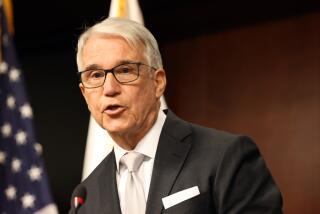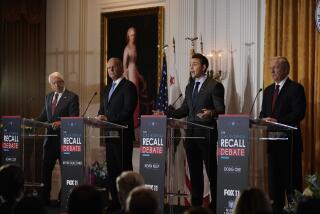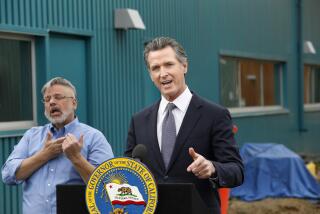Pollsters Groping for Questions
- Share via
In a normal election, polling offers some measure of clarity, an imperfect assessment of who is ahead and who is lagging at a given point in the campaign.
But the gubernatorial recall campaign is so complex, the field so crowded with candidates, that it may prove impossible for pollsters to sort through the confusion and gauge how the race is shaping up, according to polling experts and campaign officials.
In this race, experts say, be cautious of polls.
“The pollsters may be more confused than the voters themselves,” said K.B. Forbes, spokesman for the Bill Simon campaign. “Their margin of error may be higher, and I think they may be scratching their heads.”
Polling, Forbes said “will not be a reliable indicator.”
But clearly, the pollsters will be heard. Though the deadline for filing was not until Saturday, polls were already being taken. A CNN/USA Today/Gallup Poll taken over the weekend reported that Gov. Gray Davis was likely to be recalled and replaced by actor Arnold Schwarzenegger.
That poll, conducted as the field was crystallizing, underscores the difficulty of polling in a fast-moving campaign with two interconnected ballot questions and a gargantuan list of candidates. The poll solicited opinions on some candidates who ultimately stayed out the race -- former Los Angeles Mayor Richard Riordan, U.S. Rep. Loretta Sanchez and state Insurance Commissioner John Garamendi.
David W. Moore, senior editor of the Gallup Poll, said the organization had wanted to get an “early read” on how people perceived the prospective candidates. The pollsters asked respondents about individual candidates rather than asking them to choose among the contenders -- a better way to cope with the prospect that people would choose not to run.
“I think it provides a pretty valid look at the way people are reacting initially to the candidates,” Moore said. “It doesn’t necessarily mean that, a week later, after things have settled down and the campaigns have begun, we would get the same results.”
Polling in California is never easy. It is a huge, diverse state where a good chance exists that the person picking up the phone will not speak the same language as the pollster making the call.
Compounding the difficulties are the unanswered questions surrounding the race. No one knows what the turnout will be on Oct. 7. Previous special elections, experts warn, are not a reliable guide for a first-ever recall election that is getting international attention.
Beyond that, a poll may not be able to account for uncertainty in the voting booth. Those who oppose the recall election may vote against it on Question 1 and then go home, not grasping that they are still free to choose from the list of candidates on Question 2.
“People will say, ‘I voted against the recall; therefore I shouldn’t go to the second question,’ “said Henry Brady, professor of political science and public policy at UC Berkeley.
“It’s going to be very hard for polling to get at what the degree of confusion will be. It’s a real big question. Right now, I don’t think the polling means that much except to tell you that Arnold Schwarzenegger has name recognition, and Cruz Bustamante has some, and that Gray Davis is roundly disliked.” (Bustamante, the lieutenant governor, is the most prominent Democrat in the race.)
Imperfect Science
With roughly 150 names likely to be on the ballot, pollsters will need to identify the major candidates for voters -- an imperfect science. The alternative would be to recite the entire list. Brady tries to imagine that conversation: “Of these 193 candidates, which do you like best? Let me read you the list. Are you still there? Are you still there?”
Crafting the polling question is a puzzle in its own right. Paul Maslin, pollster for Davis, made an attempt in a recent interview, coming up with a question that splits into different parts, caveats and subsets of major candidates.
There would need to be some sort of explanation: The state plans to hold an election on Oct. 7 involving the recalling of Davis. A second question on the ballot will offer a list of candidates vying to succeed the governor if he is recalled.
The candidate who gets the most votes on the second question would replace Davis if he is ousted.
That out of the way, the pollster would turn to Question 1 -- would you vote to remove Davis from office? Then, Question 2. Which one of the following half-dozen major candidates would you support? How about this other group of candidates? How about a third group?
It will be important for pollsters to remind voters that they will be choosing from a field of more than 100 candidates, Maslin said.
Key Question
Also, the poll would ask, will you stay and pick a possible successor after you have voted on whether to recall Davis, or will you leave the booth at that point -- as many voters tend to do in recall elections?
“It is light-years beyond an ordinary general election,” Maslin said. “You have multiple candidates; multiple candidates for each party; a condition on one vote where the second vote only matters if the first vote goes a certain way. There is no way you can, in a telephone poll, replicate the actual ballot. It’s the most challenging exercise for pollsters ... that I’ve seen in 25 years of being in the business, by far. There’s not anything that comes remotely close to it.”
With polling results unreliable, candidates may turn to smaller focus groups, where they can actually show voters the lengthy ballot, to better read the public’s sense of the race, campaign officials said. In a focus group, a small number of representative voters sits in a room and answers questions, giving insight into how ordinary people think about the race.
“The leading campaigns aren’t going to spend a lot of money on polling,” said Harvey Englander, a Los Angeles political consultant.
Because of the inevitable confusion over the ballot, it may be smart to wait a few weeks before a poll is even conducted, some experts said. By that time, people may have absorbed enough about the race to answer poll questions intelligently.
“I might wait until about 20 days out -- after there’s been a lot of discussion on it,” said Ken Khachigian, a Republican strategist who advised U.S. Rep. Darrell Issa on Issa’s abortive gubernatorial bid.
“There’s this whole learning curve people have about how they participate in this,” said Jean Johnson, senior vice president at Public Agenda, a nonprofit research organization in New York.
Still, early polls have some value: they track the public’s changing perceptions of the candidates. Schwarzenegger, for example, is a prominent figure in pop culture known largely for his movies. His position on many issues is not yet clear. A poll could gauge whether Schwarzenegger’s celebrity is enough to win him the job, or whether doubts are creeping in as the scrutiny intensifies.
“Take more snapshots, and you’ll get a picture of how voters are coming to judgment on each of these candidates,” said Mark DiCamillo, director of the San Francisco-based Field Poll.
*
(BEGIN TEXT OF INFOBOX)
Poll watch
This is the first in a series of reports examining polls related to the California recall election. The report offers a sampling of the latest public-opinion surveys as well as analysis on how to interpret the numbers.
CNN / USA Today / Gallup
What the poll says:
If the recall election were being held today, would you vote to:
Remove Davis from office -- 64%
Keep Davis in office -- 29%
If Davis is recalled, ‘very good’ or ‘good chance’ chance of voting for each candidate:
Arnold Schwarzenegger -- 42%
Richard Riordan* -- 24%
Cruz Bustamante -- 22%
Bill Simon -- 13%
Tom McClintock -- 13%
Loretta Sanchez* -- 12%
John Garamendi* -- 10%
Bill Jones* -- 8%
Arianna Huffington -- 7%
Peter Ueberroth -- 7%
* Did not file.
What to keep in mind: The poll was conducted before the field was crystallized. It solicited opinions on some candidates who ultimately stayed out of the race: former L.A. Mayor Richard Riordan, U.S. Rep. Loretta Sanchez, former Secretary of State Bill Jones and state Insurance Commissioner John Garamendi. Gallup Poll officials said they wanted to get an ‘early read’ on how people perceived the prospective candidates.
Telephone survey of 801 registered voters, conducted Sunday. Margin of sampling error is +/- 4 percentage points.
--------------------------
NBC / Hart-Teeter Research
What the poll says:
Opinion of Davis
Very / somewhat negative opinion -- 64%
Very / somewhat favorable opinion -- 22%
Candidate support
Arnold Schwarzenegger -- 31%
Cruz Bustamante -- 18%
Bill Simon -- 6%
Peter Ueberroth -- 6%
Tom McClintock -- 4%
Arianna Huffington -- 4%
Other -- 3%
What to keep in mind: This poll was taken a few days after Arnold Schwarzenegger’s highly publicized entry into the recall race on “The Tonight Show With Jay Leno.” Polls taken soon after a candidate enters the race often show a spike in support for that person.
Survey of 510 registered voters, conducted Sunday. Only six replacement candidates were asked about by name.
More to Read
Get the L.A. Times Politics newsletter
Deeply reported insights into legislation, politics and policy from Sacramento, Washington and beyond. In your inbox twice per week.
You may occasionally receive promotional content from the Los Angeles Times.










